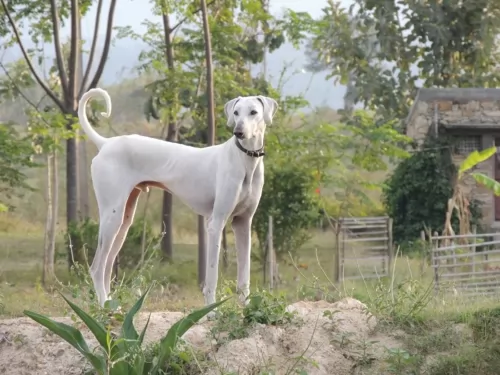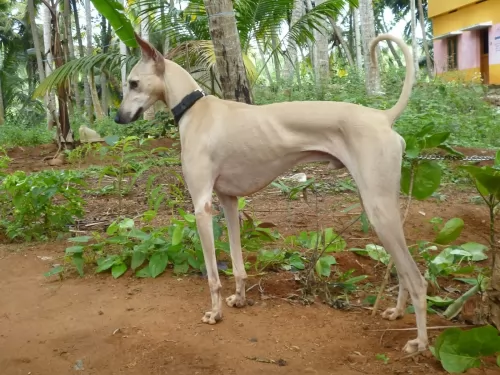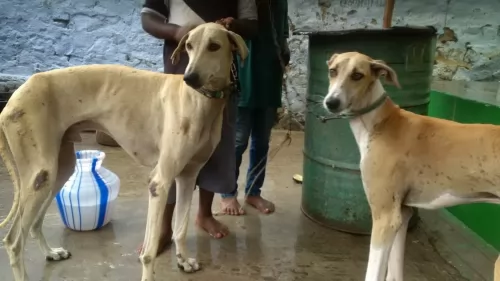 Petzlover
Petzlover Black Norwegian Elkhound is originated from Norway but Chippiparai is originated from India. Black Norwegian Elkhound may grow 14 cm / 5 inches shorter than Chippiparai. Both Black Norwegian Elkhound and Chippiparai are of same weight. Both Black Norwegian Elkhound and Chippiparai has same life span. Both Black Norwegian Elkhound and Chippiparai has same litter size. Both Black Norwegian Elkhound and Chippiparai requires Low Maintenance.
Black Norwegian Elkhound is originated from Norway but Chippiparai is originated from India. Black Norwegian Elkhound may grow 14 cm / 5 inches shorter than Chippiparai. Both Black Norwegian Elkhound and Chippiparai are of same weight. Both Black Norwegian Elkhound and Chippiparai has same life span. Both Black Norwegian Elkhound and Chippiparai has same litter size. Both Black Norwegian Elkhound and Chippiparai requires Low Maintenance.
 The Black Norwegian Elkhound was first bred in Norway in the early part of the 19th century as a smaller version of the Grey Norwegian Elkhound. The Black version is a Spitz and is very seldom seen anywhere in world but Norway. He is designed for the same job that the Grey Norwegian Elkhound performed. The difference is that the Black Norwegian is smaller, easier to see in the snow and ice of Norway and smaller than the Grey. It is a hunter, a herder, a guard dog and a watch dog. Because of the temperatures in Norway it was very important to have a hunting dog that was able to deal with the cold, the snow and the heavy fall rains in Norway and Scandinavia. The Black Norwegian Elkhound is a powerful and prideful dog. Much more so than the grey, he is independent and strongminded. It is highly intelligent and is one of the most ancient of breeds. He is more durable and more quarrelsome than his cousin the Grey Norwegian Elkhound or the more familiar Swedish Elkhound.
The Black Norwegian Elkhound was first bred in Norway in the early part of the 19th century as a smaller version of the Grey Norwegian Elkhound. The Black version is a Spitz and is very seldom seen anywhere in world but Norway. He is designed for the same job that the Grey Norwegian Elkhound performed. The difference is that the Black Norwegian is smaller, easier to see in the snow and ice of Norway and smaller than the Grey. It is a hunter, a herder, a guard dog and a watch dog. Because of the temperatures in Norway it was very important to have a hunting dog that was able to deal with the cold, the snow and the heavy fall rains in Norway and Scandinavia. The Black Norwegian Elkhound is a powerful and prideful dog. Much more so than the grey, he is independent and strongminded. It is highly intelligent and is one of the most ancient of breeds. He is more durable and more quarrelsome than his cousin the Grey Norwegian Elkhound or the more familiar Swedish Elkhound.
Ancestors of the Black date back to the first days human kind went hunting around 4000-5000BC. There have been skeletons of dogs very much like the Black Norwegian Elkhound found that dated back to that time period. They hunted and guarded for the Vikings and pulled sleds as well. They hunted deer, moose, badger, elk, mountain lions, bears, wolves, lynx, rabbit and reindeer. They are trackers who hold their quarry at bay by barking until the hunter can find them. Today they serve as loved family pets and guard dogs. In a National Emergency the leader of Norway can call up all the privately-owned elkhounds of any kind and assign them to work in a variety of sledding duties. Within the FCI, the Black Norwegian Elkhound is classified as a primitive Nordic hunting dog.
 The Chippiparai is a working dog found in India and until recently there has been little interest in the purity of any breed, but rather only an emphasis on the abilities of the dog. They are only beginning to research the origin and history of their native dogs such as the Chippiparai. Not much is known about the origin of the breed except that it is found almost exclusively in Tamil Nadu and Keraia in the southern part of the subcontinent of India. Other than this there is much speculation about the breed’s origin but very little-known facts. It is indeed an ancient breed; however, its origin could be thousands of years ago or simply hundreds of years ago.
The Chippiparai is a working dog found in India and until recently there has been little interest in the purity of any breed, but rather only an emphasis on the abilities of the dog. They are only beginning to research the origin and history of their native dogs such as the Chippiparai. Not much is known about the origin of the breed except that it is found almost exclusively in Tamil Nadu and Keraia in the southern part of the subcontinent of India. Other than this there is much speculation about the breed’s origin but very little-known facts. It is indeed an ancient breed; however, its origin could be thousands of years ago or simply hundreds of years ago.
• Perhaps it is a descendant of the Saluki as it resembles this breed quite a bit. It has been believed for some time that the Saluki is the original sighthound and the source of all sighthound breeds. The Saluki was very popular in the Middle East, especially in Persia and Arabia from which it could easily have spread to India. It would then have been shared from Northern India to Southern India where the Chippiparai is found.
• Perhaps the Chippiparai is a descendent of sighthounds from Central Asia and Afghanistan – the Tazi, Taigan, Hortaya Borsaya or the Afghan Hound. This part of Central Asia had more trade, influence and contact with the Indian subcontinent early in their history than with any other region. The Chippiparai is considered by some to be more like these sighthounds than like the Saluki and the interaction between these regions has a much longer history than the Middle East and India.
• It is also speculated that the Chippiparai might have been developed completely and uniquely from the local street and working dogs. With the civilization of India being one of the oldest in the world, it is considered a possibility that the Chippiparai is the descendent of the Harappan hunting dogs that probably were developed by the Indus Valley or Harappa roiling class.
Wherever the Chippiparai came from, they were the exclusive property of the wealthy and ruling castes. These upper castes were the only ones that could legally hunt with dogs or afford to feed one. The royal classes of Tiruneivell, Thanjavur, and Madurai all fed the popularity of the breed among the upper castes. They were coursing dogs used to chase down the prey once it was sighted. The Chippiparai are incredibly fast runners and would catch almost any prey and either hold it or kill it for their hunter. The Chippiparai, when not hunting, had to be chained so they would not chase any small animal that they saw. This confinement also added to the purity of the breed as random breeding was prevented.
The southern part of the Indian subcontinent is extremely hot with routine temperatures over 100’. The Chippiparai was developed to withstand these extreme temperatures and is more heat tolerant than most any other breed. They also need very little food and are resistant to the many parasites and diseases found in southern India.
Harboring the belief that Indian dogs were not as good as European ones, the occupying countries of Portugal, France, and Britain, had no interest in the Chippiparai, again leaving the breed to develop naturally on their own with little or no interbreeding. They also received no formal recognition because Indian culture only valued the dog for its working abilities. There was no Indian Kennel Club until 1956.
The Chippiparai is now very rarely and only found in the area of its birth. Many believe the breed is in danger of becoming extinct and even though it is now registered with Indian Kennel Clubs it is not often shown in their dog shows. Lovers of the breed are now attempting to get Indians to recognize that the Chippiparai is a great companion animal and attempting to save the breed.
 The Black Norwegian Elkhound is a short compact Spitz with dark eyes and a curly tail. It is the coat that sets this dog apart. It is an all-weather coat suitable for the cold, the snow and the rain of Norway. Ears are pointed and erect while the head is wedged and broad. His head is almost like that of a wolf. Its body is strong and compact. Its coat is coarse, short and double. He has a broad black nose with a straight bridge and with black lips and dark brown oval eyes. His legs and withers are strong boned and powerful with well padded feet to protect it from the freezing temperatures of Scandinavia.
The Black Norwegian Elkhound is a short compact Spitz with dark eyes and a curly tail. It is the coat that sets this dog apart. It is an all-weather coat suitable for the cold, the snow and the rain of Norway. Ears are pointed and erect while the head is wedged and broad. His head is almost like that of a wolf. Its body is strong and compact. Its coat is coarse, short and double. He has a broad black nose with a straight bridge and with black lips and dark brown oval eyes. His legs and withers are strong boned and powerful with well padded feet to protect it from the freezing temperatures of Scandinavia.
 The Chippiparai is a typical sighthound although their size and appearance will vary more than that of registered purebred sighthounds. Typically, they will have a long, domed head with small erect ears and dark eyes. Their muzzle will be as deep and wide as the skull but longer. Their legs are straight and long, their chest is roached back and deep, giving them, an appearance very similar to a greyhound or other sighthound.
The Chippiparai is a typical sighthound although their size and appearance will vary more than that of registered purebred sighthounds. Typically, they will have a long, domed head with small erect ears and dark eyes. Their muzzle will be as deep and wide as the skull but longer. Their legs are straight and long, their chest is roached back and deep, giving them, an appearance very similar to a greyhound or other sighthound.
They have a long curly tail, and their coat can vary greatly in color. They are medium sized, and their coat is short, shiny and close. He is very slender and sleek, which along with his long legs gives him that incredible speed. They are thin with visible ribs.
 This dog was made for families. He loves children and is not a one person dogs. He gets attached to everyone in the family. However, he is smart and stubborn. He loves to join in with whatever the family is doing but he does it to please himself not his owner. He loves, loves, loves to play and has the stamina to do so all day long. He is agile, bold, independent, strong, curious and loyal. His loyalty can be territorial, and he can become protective of his home and his family. This makes him an excellent watchdog until your friends come to visit and he won’t let them in the house. You need a high fence to keep him safe in your own yard and away from strangers and even guests till he gets to know them.He tends to be dominant and aggressive with other dogs. They also have strong hunting instincts.
This dog was made for families. He loves children and is not a one person dogs. He gets attached to everyone in the family. However, he is smart and stubborn. He loves to join in with whatever the family is doing but he does it to please himself not his owner. He loves, loves, loves to play and has the stamina to do so all day long. He is agile, bold, independent, strong, curious and loyal. His loyalty can be territorial, and he can become protective of his home and his family. This makes him an excellent watchdog until your friends come to visit and he won’t let them in the house. You need a high fence to keep him safe in your own yard and away from strangers and even guests till he gets to know them.He tends to be dominant and aggressive with other dogs. They also have strong hunting instincts.
 The Chippiparai is a loving, gentle family dog if well socialized, well trained and well exercised. They are very intelligent and need human companionship. Once they are living with a human family, they are very protective of that family. They are for the most part peaceful and quiet dogs. They are loyal and loving but they are not overly affectionate. Cuddlers they are not, and they do not like to play rough with children.
The Chippiparai is a loving, gentle family dog if well socialized, well trained and well exercised. They are very intelligent and need human companionship. Once they are living with a human family, they are very protective of that family. They are for the most part peaceful and quiet dogs. They are loyal and loving but they are not overly affectionate. Cuddlers they are not, and they do not like to play rough with children.
Accepting and loving within the family, the Chippiparai are equally hesitant and shy around strangers. They can be suspicious, but they are not aggressive. They are just very aloof with strangers, yet they hardly ever bark.
 The Black Norwegian Elkhound is a strong and hardy dog, though he is susceptible to some of the problems many breeds face. These include issues with luxating patella, optical entropion, hip dysplasia, hypothyroidism, and Fanconi syndrome. The most serious of these is the Fanconi Syndrome which is an abnormal functioning in the tubules of the kidneys. This can be a life-threatening situation.
The Black Norwegian Elkhound is a strong and hardy dog, though he is susceptible to some of the problems many breeds face. These include issues with luxating patella, optical entropion, hip dysplasia, hypothyroidism, and Fanconi syndrome. The most serious of these is the Fanconi Syndrome which is an abnormal functioning in the tubules of the kidneys. This can be a life-threatening situation.
 There are no clinical studies regarding the health and health history of the Chippiparai, so little is known about their long-term health. However, most who know the breed, believe it is an incredibly healthy one. They seem to have a lot less genetically transmitted health issues than other purebreds. Because of their isolation for centuries in India, they have developed immunities and resistance to most parasites and diseases other dog suffer from.
There are no clinical studies regarding the health and health history of the Chippiparai, so little is known about their long-term health. However, most who know the breed, believe it is an incredibly healthy one. They seem to have a lot less genetically transmitted health issues than other purebreds. Because of their isolation for centuries in India, they have developed immunities and resistance to most parasites and diseases other dog suffer from.
Because of this you should look for the types of issues that occur in dogs of this size and build. Have them tested by the Canine Eye Registration Foundation and the Orthopedic Foundation for Animals.
 This is an energetic active dog, or she should be. Feed her high nutritious food twice a day. Do not overfeed.
This is an energetic active dog, or she should be. Feed her high nutritious food twice a day. Do not overfeed.
The most potentially troublesome health issue is Fanconi Syndrome. This kidney disorder can impact the of the body’s absorption of electrolytes, water and nutrients. These nutrients include Sodium, Potassium, Glucose, Phosphate, Amino Acids and Phosphate
The Black Norwegian Elkhound loves to play, and they love to work. Exercise is vital, but it must be one of those two things – play or work. Don’t leave him alone to figure it out for himself or you wont like what this intelligent dog decides to do. She needs a large yard, a long walk daily but jogging with you is even better. Make him heel when on leash or he will think he oversees you. These are roaming dogs who will follow a scent anywhere and ignore your commands for her to come to you. They are better off on a leash unless you are in a dog park or a fenced yard.
The Black Norwegian Elkhound is great at all dog athletics, games and sports such as agility, rally obedience, flyball, tracking, herding.
 Do not overfeed your Chippiparai. Feed twice a day and no more than a total of 2.5 cups of high quality dry food.
Do not overfeed your Chippiparai. Feed twice a day and no more than a total of 2.5 cups of high quality dry food.
As mentioned previously the Chippiparai seems to have no genetic diseases or issues and very few acquired ones. However, he is sensitive to anesthesia and some foods. He is intolerant to cold weather and has a hard time with his pads on hard surfaces. Some Chippiparai might experience some of the ailments other breeds like them experience.
Both Elbow and hip are possible. This can cause arthritis and lameness. This occurs when the bone does not fit well into the joint.
This can cause lameness as well. The kneecaps slide over the knee instead of staying in place.
This is a hunting dog and he will want to hunt. They are incredibly fast and need the opportunity to run. Brisk walks will not be enough for this dog. He is very energetic. They will chase any small animals. It is not recommended that you have small pets even small dogs or cats with a Chippiparai. Having been bred for centuries to hunt, they are not likely to respond to any commands if they are off lease and chasing prey. Do not allow them to be off leash unless in a fenced area, and that fence needs to be 8 feet tall as they can easily jump a seven-foot fence. Try they at coursing, agility, fly ball and frisbee competitions.